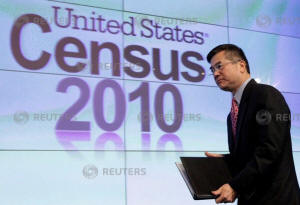|
Citizenship question could hamper U.S.
Census response: official
 Send a link to a friend
Send a link to a friend
 [November 03, 2018]
By Nick Brown [November 03, 2018]
By Nick Brown
NEW YORK (Reuters) - The Trump
administration's decision to ask about citizenship on the 2020 Census
questionnaire could undermine the quality of the data by discouraging
non-citizens from responding, the U.S. Census Bureau's chief scientist
said.
But, added John Abowd in written testimony seen by Reuters, the question
will not necessarily lead to an undercount, because the government has
strategies to "mitigate these effects."
Abowd's declaration, which has not previously been made public, comes as
the administration of President Donald Trump prepares to defend the
controversial policy shift in a two-week trial scheduled to begin on
Monday in federal court in New York.
The addition of the citizenship question was announced in March by
Commerce Secretary Wilbur Ross, who billed it as a way to enforce the
Voting Rights Act. The act requires a tally of citizens of voting age to
protect minorities against discrimination.
Eighteen states and 15 cities have since sued the administration,
arguing that the new question is actually intended to depress
participation in the Census by immigrants, who tend to reside in
Democratic-leaning areas.

If undercounted, areas with high immigrant populations could lose seats
in the U.S. House of Representatives, as well as their share of more
than $800 billion in federal aid, both of which are allocated based on
population data.
Abowd, the government's main witness in the trial, acknowledged in his
declaration that the question could "lower the quality of census data."
But he said there was "no quantitative evidence" it would lead to an
undercount, citing other means of enumeration, like following up with
non-responders, gathering data from existing government records, and
estimating data that cannot be found directly.
[to top of second column]
|

U.S. Commerce Secretary Gary Locke arrives at the presentation of
the 2010 Census U.S. population at the National Press Club in
Washington December 21, 2010. REUTERS/Yuri Gripas//File Photo

Earlier this year, Abowd was among the Census Bureau officials that
advised Ross against adding the question, saying it could discourage
participation.
Some census experts argue that, while there is no data suggesting
the citizenship question will lower the overall count, there is also
no evidence to the contrary.
Former U.S. Census Bureau Director John Thompson, an expert witness
for the plaintiffs, said in a September declaration that "obtaining
such documentation would involve a multi-year testing" program.
The Trump administration has denied any pretext for adding the
question, saying the rationale is supported by "an extensive
administrative record," and is legally enforceable even if the
plaintiffs show that Ross may have had other motivations for the
decision.
The government argues that in order to block the question,
plaintiffs would need to prove that the bureau would be unable to
avoid an undercount. Abowd's testimony is central to the
government's defense on that point.
While the trial is set to start Monday, the Trump Administration has
asked the U.S. Supreme Court to delay it.
(Reporting by Nick Brown, Editing by Richard Valdmanis and Rosalba
O'Brien)
[© 2018 Thomson Reuters. All rights
reserved.]
Copyright 2018 Reuters. All rights reserved. This material may not be published,
broadcast, rewritten or redistributed.
Thompson Reuters is solely responsible for this content.
 |